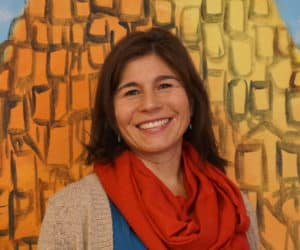How Andrea Plaza is Working Toward Immigrant Justice in New Mexico

Andrea Plaza, Executive Director of Encuentro
Growing up in the Carolinas, Andrea Plaza and her family were one of the few Latinx families living within a 100-mile radius.
“I think my family had two lives,” Andrea recalls. “The kind we lived at home and the kind we lived outside the home. That certainly presented some questions for me in terms of who I was and what my background meant.”
When she began her education at the University of North Carolina, Andrea found herself gravitating toward other Latinos. She wanted to expose herself to a different cultural experience than what she had known growing up in the South. This newfound cultural solidarity, in tandem with her Catholic upbringing, began shaping how Andrea viewed herself, her background, and what she could offer her community.
Andrea then decided to pursue graduate studies in New Mexico. This is where she would put down roots, build a home, and establish herself professionally—in a state that has a deep history and culture of immigration. She began her career in microenterprise development, helping immigrant women access financial services. Her passion for immigrant justice eventually led her to found Encuentro, an organization dedicated to strengthening immigrant parents, families, and communities in the state, and a grantee partner of the WES Mariam Assefa Fund.
“I never saw myself as an executive director, but I wanted to address the need for adult education opportunities for immigrants in New Mexico,” Andrea says.
Encuentro began as a project providing English language lessons and other components of adult basic education. The majority of Encuentro’s clients were undocumented, so Andrea and her colleagues began to explore ways to help clients access job opportunities and pursue careers. After about four years, Encuentro started developing self-employment pathways through small business training and financial education.
In 2015, Andrea and the Encuentro team began working in the home health sector after noticing that many community members had found themselves serving as caretakers of elders, though they had little to no training. Encuentro developed a curriculum in Spanish that prepared students to safely and effectively work as home health aides.
Once its first cohort of students graduated, Encuentro quickly identified solutions to some of the other barriers their students facing in gaining employment in the caregiving field.
“They could get all the training in the world and still have problems connecting with individuals in the community who need care,” Andrea says. To address this challenge, Encuentro launched EnCasa Care Connections, an online matching service that connects elders and their families to Encuentro Home Health Aide graduates without the use of an intermediary agency. This direct connection allows workers to keep their entire wage and saves the family 20 to 30 percent in caregiving costs. Encuentro also created an internship program which funds the work of home health aides who care for low-income seniors in the community.
The importance of home health aides—and the challenges they face—have become even clearer in the wake of the COVID-19 pandemic. As the role of essential workers has gained national attention, creating a pathway to citizenship for undocumented workers has become a topic of debate in Congress. Only 50 percent of immigrant home health aides in the U.S. are naturalized citizens, so new federal pathways to citizenship are extremely relevant to Encuentro’s work.
“There is an explosive demand for caregivers, and immigrants can help fill these roles,” Andrea points out. “But they cannot fully do so unless doors to residency status and citizenship open.”
While conversations about essential workers and pathways to citizenship play out on the national stage, Encuentro continues to drive change at the community and state levels. Its new report, Reflections on a Community and Immigrant-led Home Health Care Program, emphasizes the importance of training for the home health labor force in the context of New Mexico’s rapidly growing elderly population. The report also presents evidence in support of creating a formal certification program for home health aides.
“Without certification, we cannot start building wages in this field,” Andrea says.
Andrea believes that an increase in wages will create higher levels of social capital, especially of the immigrant women who make up 7 percent of the total U.S. labor force. Social capital is important to leadership development within the immigrant community, and has played a major role in the trajectory of Andrea’s own career.
She encourages other emerging leaders to accept that everyone is learning on the job and to recognize the importance of making connections and learning from each other.
Andrea’s advice to young leaders: “Be vulnerable, be proud of the things you know, and be confident in what you believe in.”
Stay in Touch
Thank you for your interest in the WES Mariam Assefa Fund. We’ll share updates on the Fund’s efforts, what we’re learning, and opportunities through our email list.